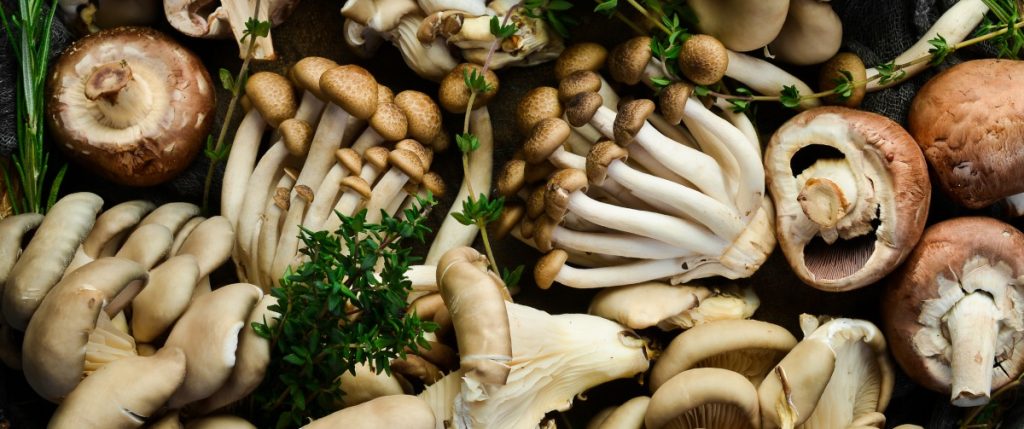We know that mushrooms are incredibly nourishing, but which mushrooms are healthiest? The answer is: it depends!
If you’re looking for a certain nutrient profile, you may prefer one type of mushroom over another. But at the end of the day, any mushroom that isn’t toxic is going to do wonders for your body.
Let’s explore some of the healthiest mushrooms to eat.
1. Button and Portobello Mushrooms
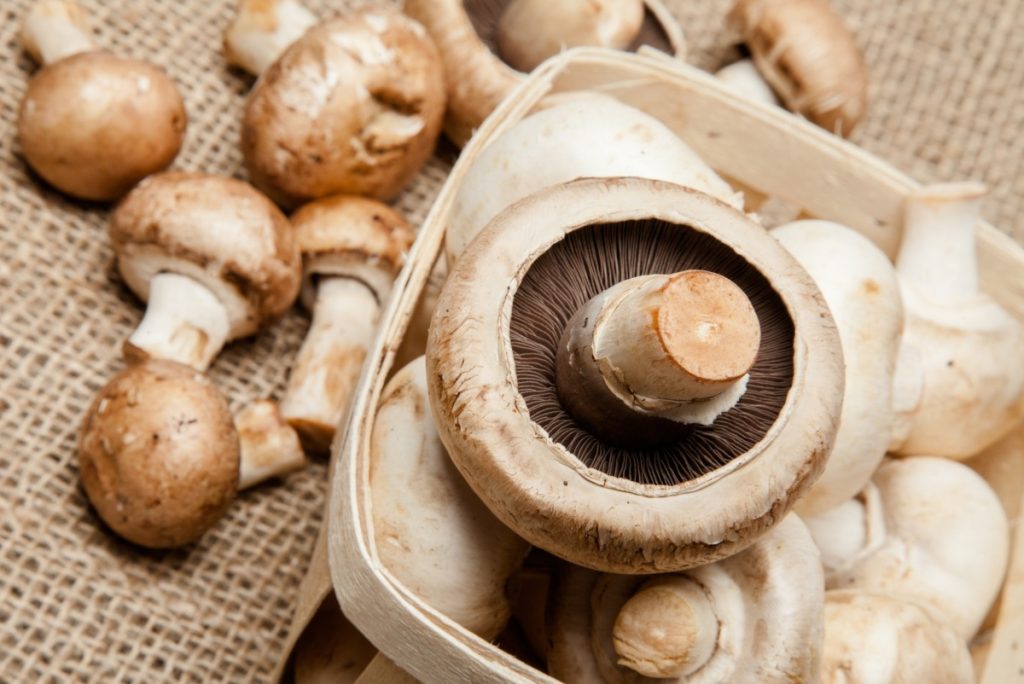
If you pay a visit to your local salad bar or grocery store, chances are you’ll see a lot of button mushrooms on offer.
Button mushrooms (and their fully matured siblings, portobello mushrooms) are popular for their mild and palatable flavor. They come in shades of both brown and white, and both have a similar nutrient profile.
If all you ever try is the humble button mushroom, you’ll get plenty of nourishment. They’re chock-full of B vitamins, which are essential for regulating your nervous system and maintaining energy.
They’re also tasty little disease fighters. Containing both selenium and conjugated linoleic acid, button mushrooms have proven cancer-fighting potential.
2. Porcini Mushroom
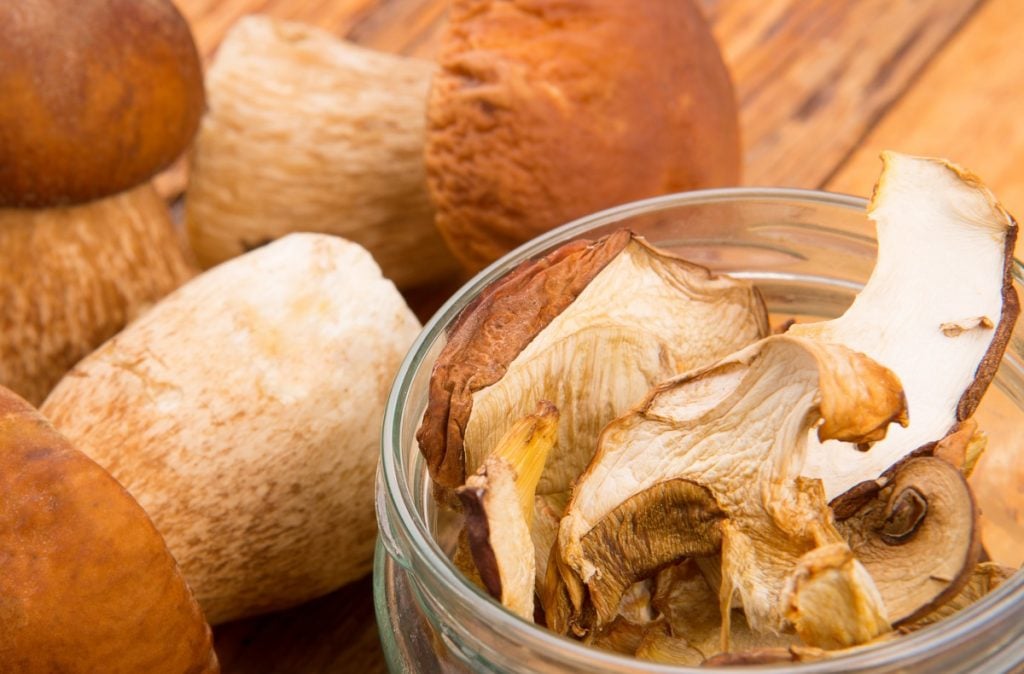
We love porcinis for their rustic look and for the texture and meaty flavor that they add to dishes. The good news is that they’re super healthy, too.
Porcinis are mycorrhizal mushrooms, meaning they form symbiotic relationships with the roots of plants.
Why does this matter? Because some scientists believe that mycorrhizal mushrooms are even more nutrient-dense than other types of mushrooms.
Porcinis are also antioxidant powerhouses. They contain beta-carotene, which is critical for good eye health, and lycopene, which is excellent for protecting your heart.
Porcini mushrooms are popular in Italian cuisine. So next time you’re at an Italian restaurant, search for them on the menu!
3. Oyster Mushroom
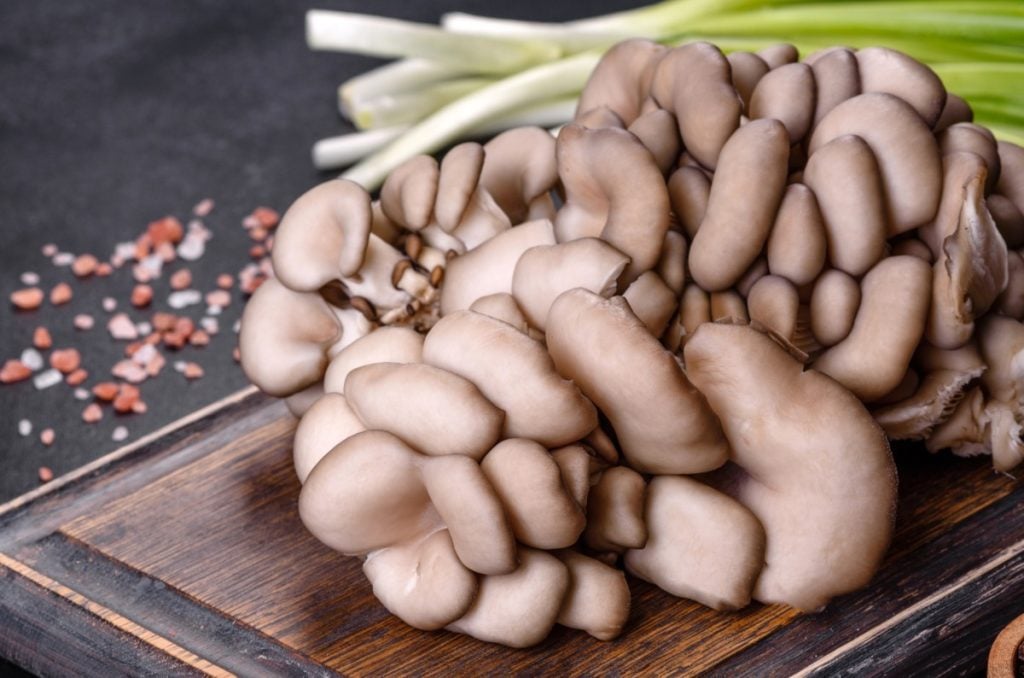
It’s no secret that we’re big fans of the oyster mushroom here at GroCycle. It’s one of the easiest mushrooms to grow, and we’ve developed a series of courses teaching you how to do it.
But why are we so wild about these gorgeous mushrooms? Besides the subtle complexity they add to all of our favorite dishes, we like what they do for our immune systems!
Immune health has been front of mind for many folks the past few years, so it’s no surprise that interest in growing oysters has skyrocketed.
The nutrients found in oyster mushrooms have been known to both boost the immune system and successfully reduce the severity of viruses.
4. Chanterelle Mushroom
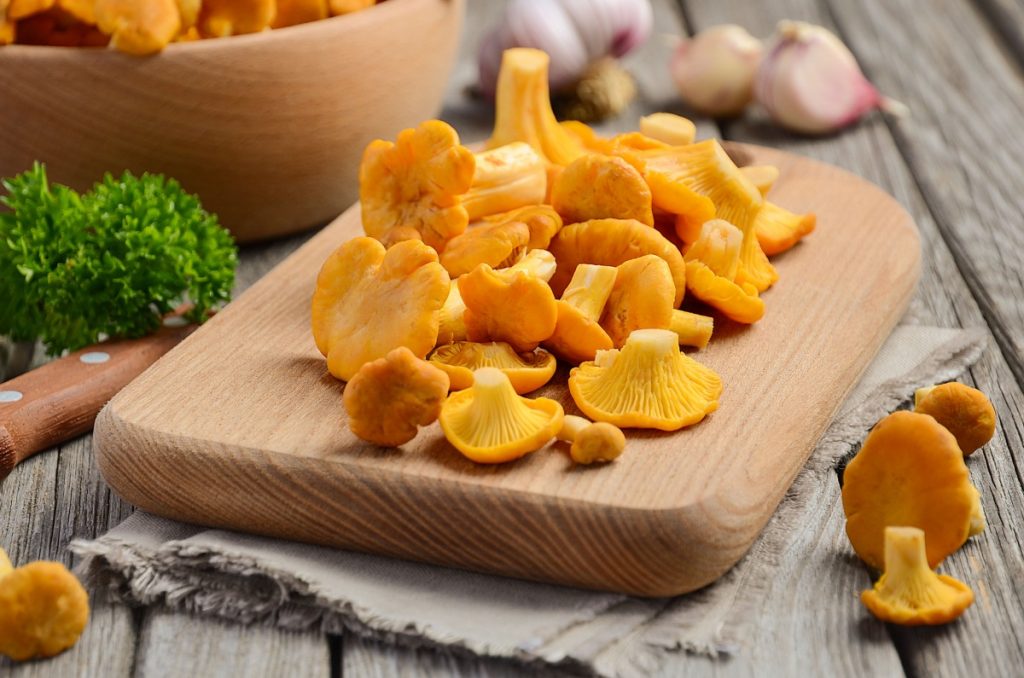
The golden-yellow chanterelle looks pretty on a plate and adds a fun peppery flavor to dishes.
Appropriate for their sunny color, chanterelles are famous for being packed full of Vitamin D.
Because most of us don’t spend much time in the sun these days, a lot of us are lacking in this essential vitamin.
A vitamin D deficiency can wreak havoc on your health, leading to fatigue, frequent illness, bone and hair loss, aches and pains, and even depression.
So next time you’re making a hearty pasta dish, throw in some chanterelles and avoid the (literal) headache.
5. Maitake Mushroom
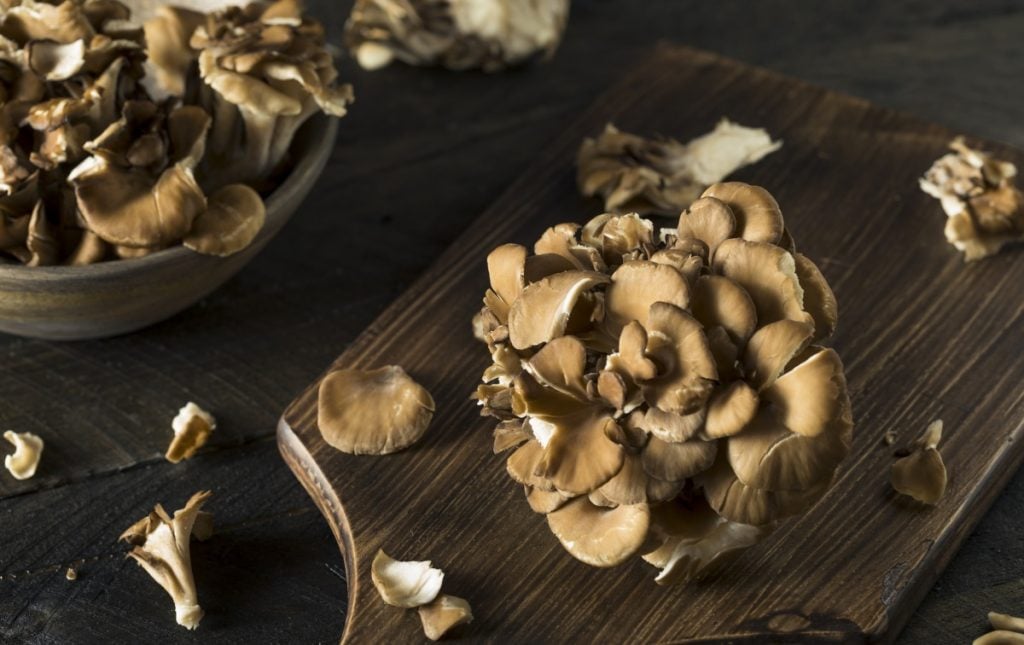
If you’re interested in the wellness world, you may hear the word adaptogen tossed around frequently. An adaptogen is a substance that helps your body adapt to and overcome stress.
If that sounds like something you could use, you’re in luck; maitake mushrooms are excellent adaptogens.
When you enjoy some maitakes with your eggs in the morning, for example, you’re helping to stabilize your cortisol and to prepare your body for another high-octane day.
6. Chaga Mushroom
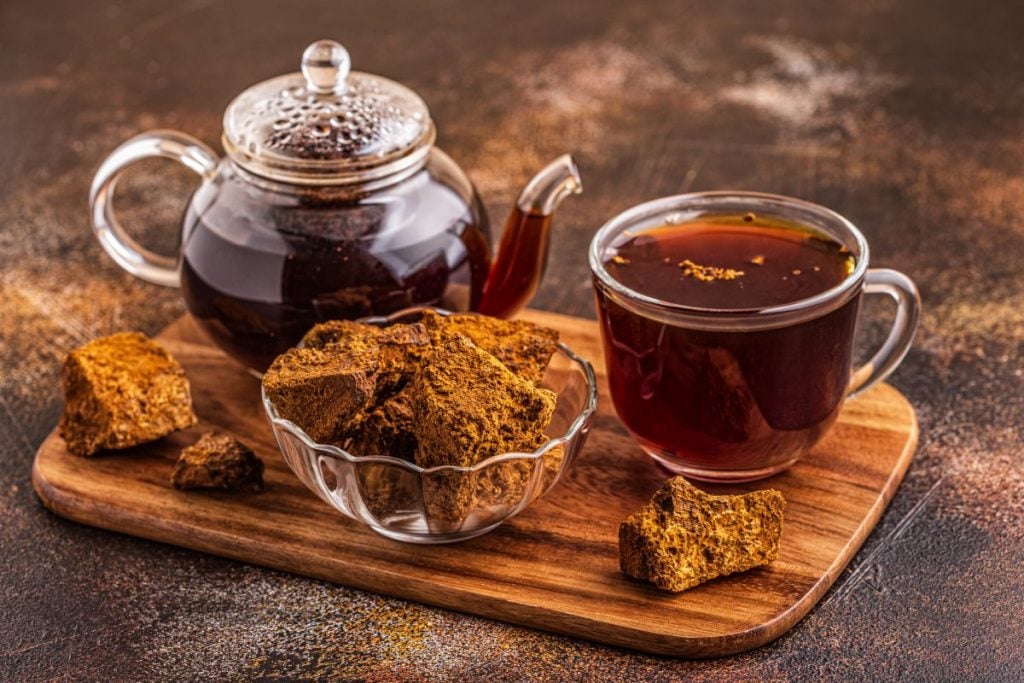
If you come across a chaga mushroom growing on a tree, you may not think it looks like something that benefits your health.
It looks more like a charred piece of wood than a vehicle for good nutrition.
But looks can be deceiving, and chaga mushrooms are one of the most healthy foods you can consume.
In fact, people consume chaga exclusively for health benefits; it’s not something you cook and eat for the taste.
Many folks consume chaga in powdered or pill form, or as tea. Why? Chaga mushrooms are excellent at combating cancer, reducing inflammation, balancing blood sugar, and lowering cholesterol.
7. Lion’s Mane
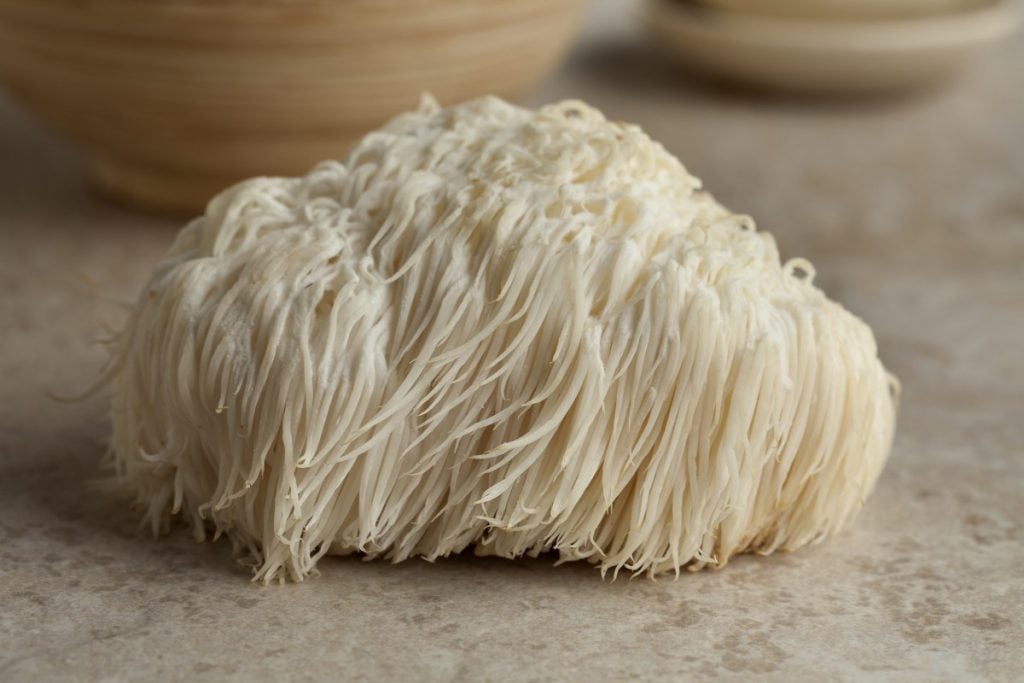
One of the most interesting-looking mushrooms on our list, the lion’s mane mushroom has a shaggy, white appearance. It also has some of the most unique health benefits.
If you struggle with depression and anxiety, lion’s mane may be able to help. It can also help protect against dementia, speed up the healing of nervous system injuries, and even protect against ulcers.
If you’re interested in adding lion’s mane to your recipe rotation, we recommend trying it in place of the crab in vegan “crab” cakes!
8. Reishi Mushroom
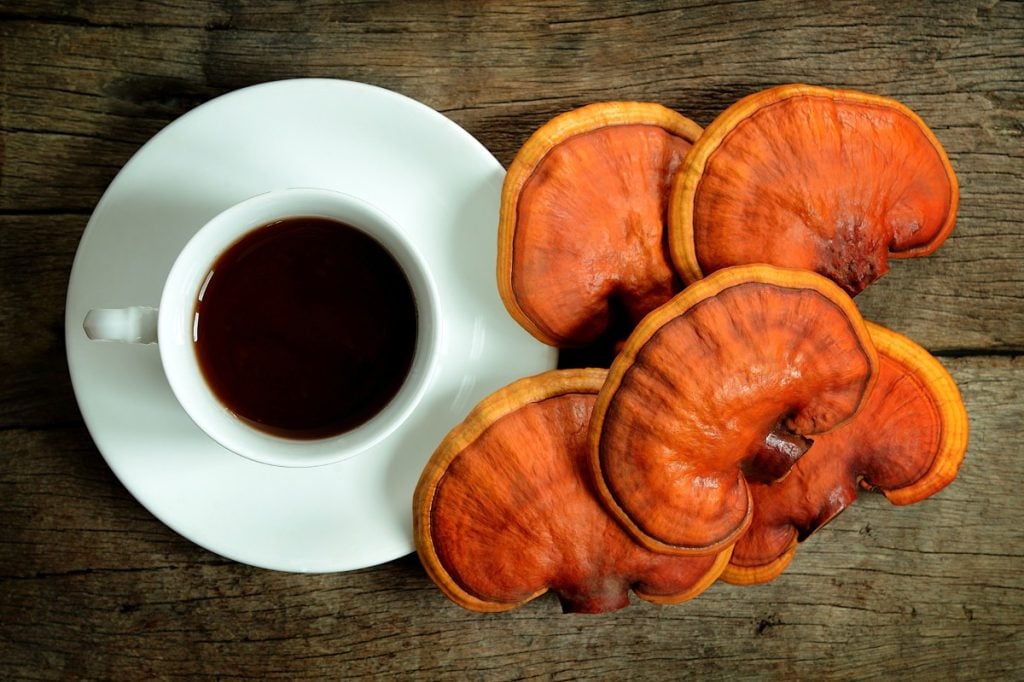
Have you heard of reishi mushrooms? These gorgeous, shiny and red mushrooms are revered in the wellness world.
Although you can technically cook and eat reishi mushrooms, most folks prefer to consume reishi via tea or a powder.
If you’re feeling a little low lately, reishi may be a great food to introduce into your diet. Studies show that it can help reduce both fatigue and depression.
It can also help to protect your heart, manage your blood sugar and fight cancer.
9. Morel Mushrooms
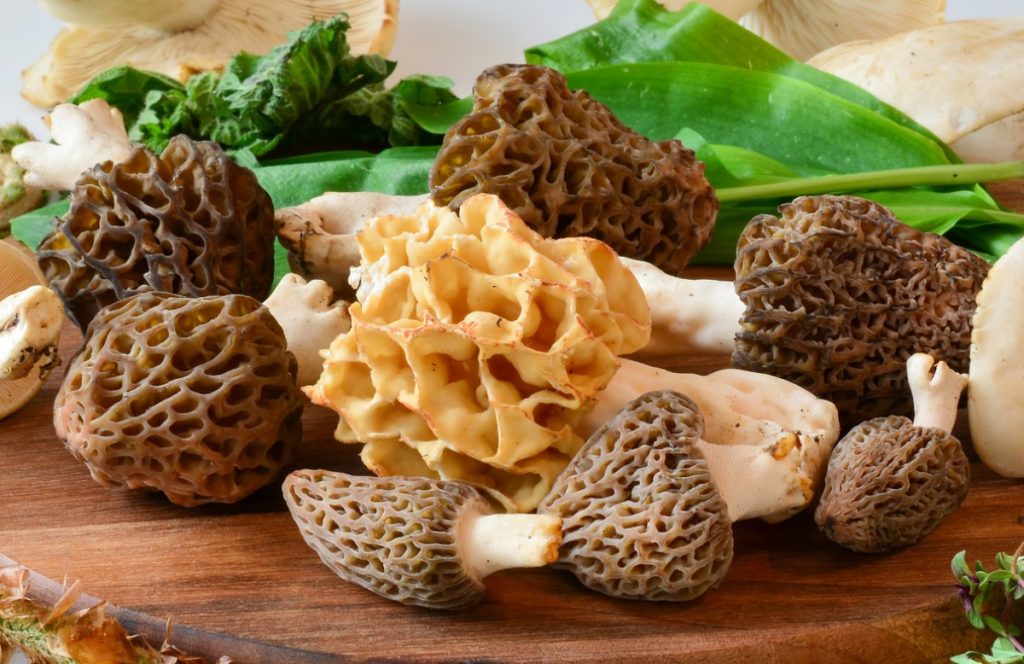
Morels are considered a real treat by many mushroom aficionados. They have a unique, earthy flavor that makes any meal you include them in a delicacy.
You’re not only getting taste benefits when you eat morels, but you’re also doing great things for your bones. That’s because morels are packed full of calcium.
Getting a regular dose of morel mushrooms can help prevent osteoporosis and other conditions where bones are weakened.
Morels can be hard to find in the grocery store, so you may try your luck at farmer’s markets, order dehydrated morels online or grow them yourself.
10. Black Truffle Mushrooms
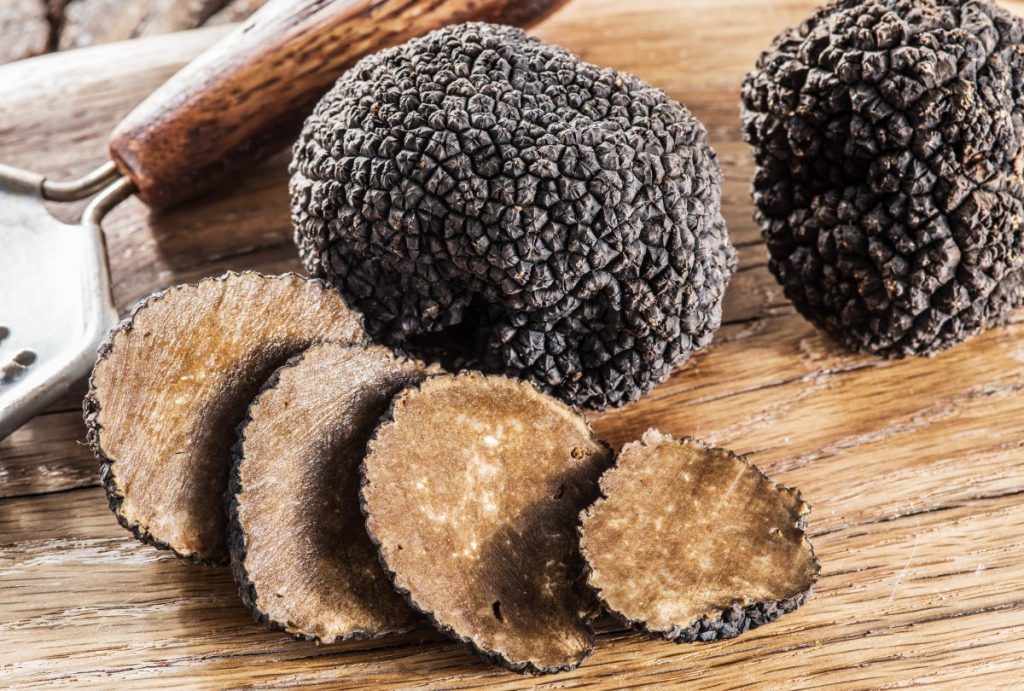
Even if you don’t know much about mushrooms, chances are you’ve heard of black truffles.
These mushrooms have an indulgent taste and lend their flavor to all kinds of salts, oils and butters.
Luckily, this is one instance where something that tastes good is also good for you. In this case, black truffles are good for your state of mind.
Studies have found that black truffles enhance your mood in a similar way to marijuana—but without the high.
11. Shiitake Mushrooms
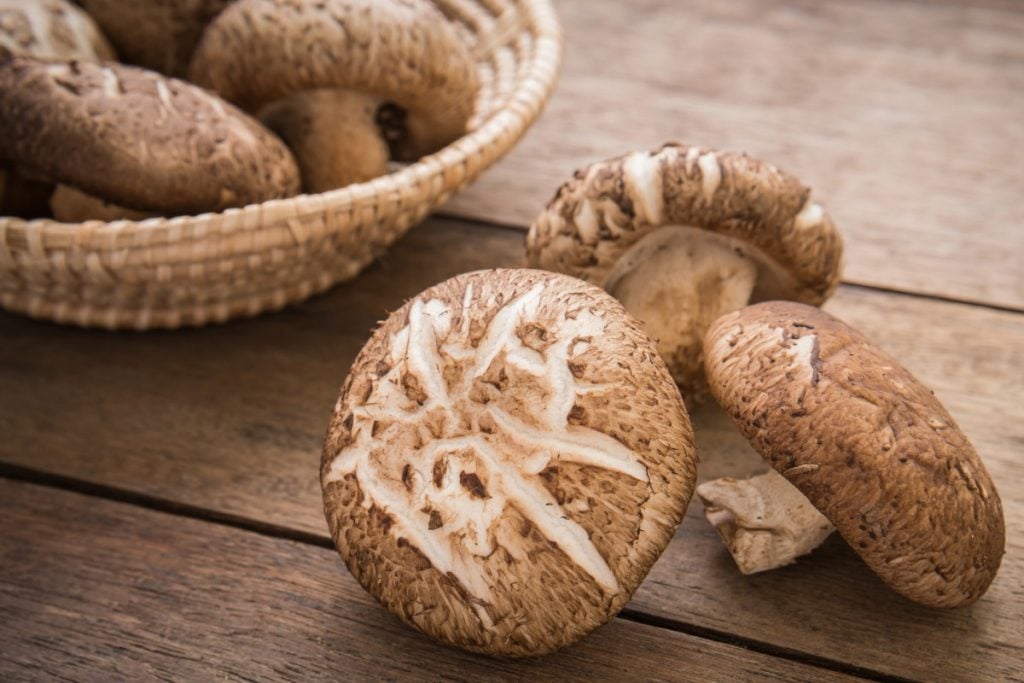
Shiitake mushrooms add a complex, umami flavor to many dishes and are typically easy to find at your local grocery store.
They’re an excellent mushroom to include in your routine if you’re looking to ward off cancer since they contain lentinan: an anti-tumor compound.
Shiitakes are great in veggie medleys and soup, but if you prefer not to eat them in your meals, you can also get them in capsule form.
12. Enoki Mushrooms
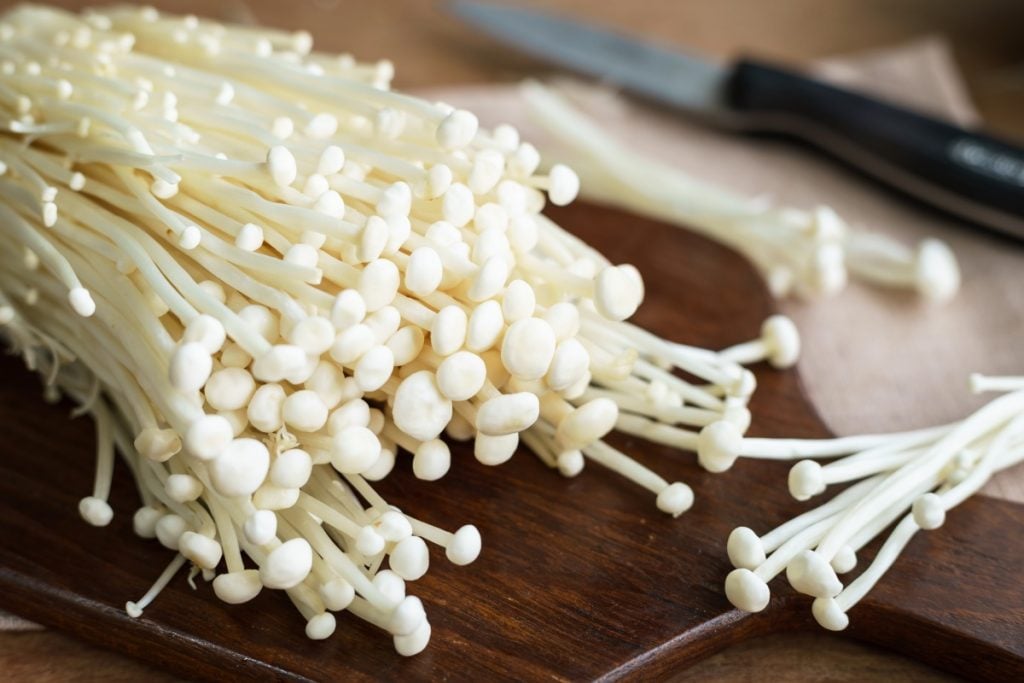
Enoki mushrooms are a great “starter” mushroom for folks who aren’t sure about eating fungus yet. These mushrooms have a mild and pleasant flavor.
More importantly, enoki mushrooms are excellent for brain health and memory. Studies show that regular consumption of enoki mushrooms can help protect against learning impairments.
Enoki mushrooms make an excellent, nutrient-dense addition to hearty stews and soups.
13. Turkey Tail Mushrooms
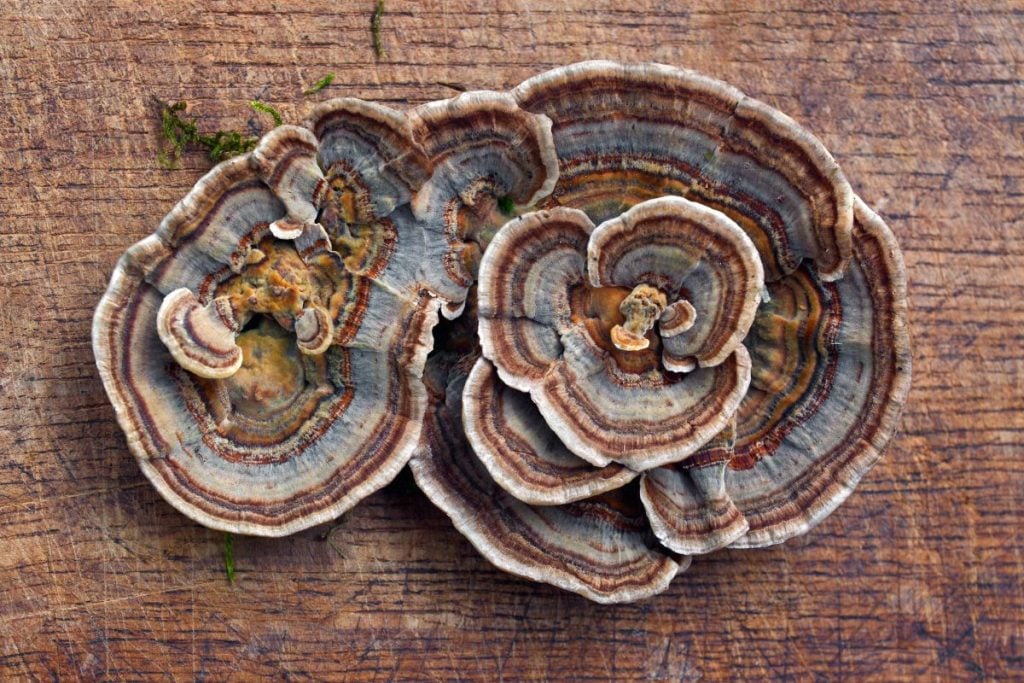
Turkey tail mushrooms got their name from their appearance, not their taste. They don’t taste like turkey. In fact, they don’t taste like much of anything.
For this reason, most people don’t cook with turkey tail mushrooms, but instead take them in powder or capsule form to reap their health benefits.
Turkey tail mushrooms are known for being excellent for respiratory health and have been used accordingly in Chinese medicine for centuries.
14. Cordyceps
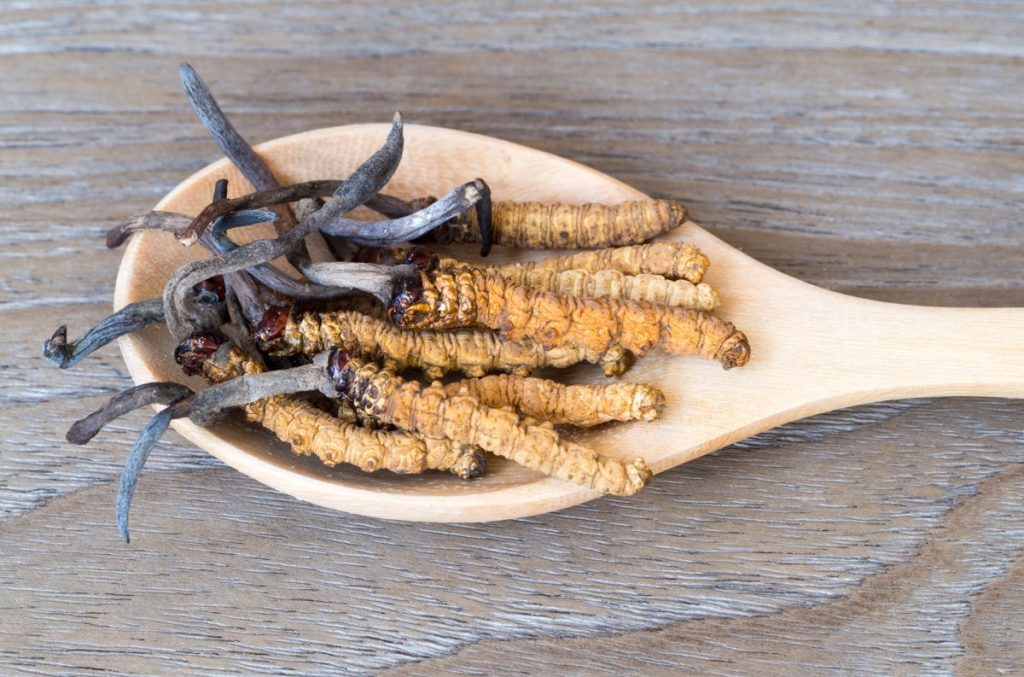
If you’re an athlete, you may be privy to the awesome effects of cordyceps mushrooms.
Typically consumed as tincture, capsule or powder, cordyceps mushrooms offer numerous health benefits and are renowned in the athletic world for boosting exercise performance.
Studies show that consuming these mushrooms can help your body efficiently use oxygen while you’re working out.
So whether you’re doing sports competitively or just enjoy a neighborhood game of pickup basketball on the weekends, cordyceps may be a great option to add to your routine.
The Healthiest Way to Cook Mushrooms
If you’re planning to add mushrooms to your diet for all the health benefits, then you certainly don’t want to cook all the nutrients away.
Unfortunately, some cooking methods can deplete mushrooms of the vitamins and minerals that make them so good for you.
So which cooking method is best? You may be surprised to learn that microwaving is at the top of the list, followed closely by grilling.
In addition to preserving the mushrooms’ nutrients, these two methods activate some of the antioxidant benefits that you don’t get if you eat mushrooms raw.
Final Thoughts
No matter which type of mushroom you choose to eat, it’s hard to go wrong.
All (non-toxic) mushrooms will provide you with a healthy dose of vitamins, minerals, fiber and antioxidants you need to thrive.
If you do find that you’re making mushrooms a regular part of your diet and don’t want to continue purchasing them at the store, you may want to start growing your own.
Growing your own oyster mushrooms is a lot easier than you think, and we have several courses that walk you through exactly how to do it.
